You Seriously Need to Read Joe Kelly's JLA Run
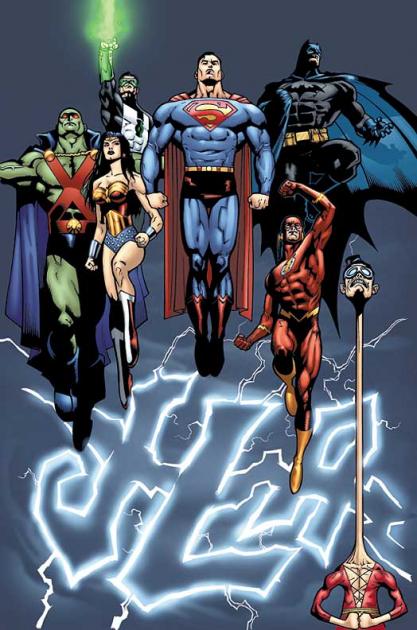
Idealism is not dead.
Joe Kelly is personally responsible for what I consider one of the most politically conscious, ethically challenging, and respectfully diverse comic runs ever written. I'm talking about his JLA run—a run that followed two of the hardest acts in the entire sequential-art medium: Grant Morrison and Mark Waid. Given the precedent set for him, Kelly rose to the occasion and delivered a more than adequate run, which stood equal in quality to the more recognized and applauded authors who preceded him.
Doug Mahnke, whose art is wholly unique and of a caliber not many can match, accompanied Kelly's stories with figures of chiseled, burly superheros that compel the reader to believe they actually could bend steel and toss planets. His work was classy and stylish even when it was gritty and bloody, making use of both geometry and light to make his characters striking and bold, against a dramatic collection of theatrical backgrounds and appropriately chiaroscuro scenery.
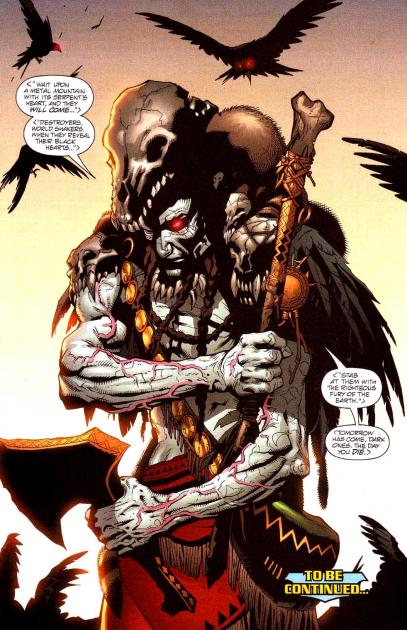
In the captain's chair from issues #61-93, and with a following mini-series called Justice League Elite that ran twelve issues, Kelly's time with the team lasted almost four years. The theme of his work was already touched on in his phenomenal one-and-done Action Comics #775 story, “What's So Funny About Truth, Justice and the American Way?”, in which Superman is confronted by the brutal psychic vigilante Manchester Black, challenged with the apparently outdated and ineffective nature of his “there's always a better way” no-killing creed. But, in retaliation, standing up for idealism and innocence, Superman finds a better way against impossible odds.
This is typical of Kelly's writing—stories that raise a middle finger to the idea that moral principles have to evolve with the ages, or that the stories of yesterday have less meaning just because our times are darker. Kelly wrote a dark, bloody run, no doubt, but he did so with the intent of showing our heroes' true colors—standing tall for truth and justice, no matter what deconstructionist reexaminations everyone else seemed to advocate in the superhero genre.
Joe Kelly is basically the anti-Mark Millar.
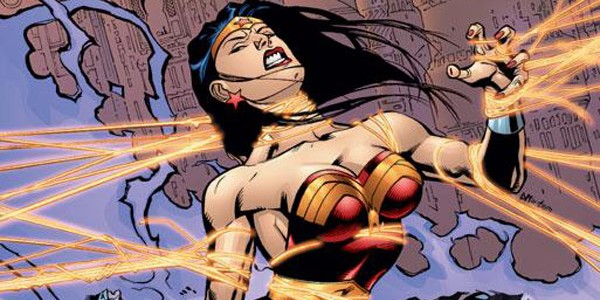
In Kelly's first arc, Golden Perfect, the Justice League's avatar of truth, Wonder Woman, is brought low and made to face the reality of modern politics in her archaic worldview. Her fabled Lasso of Truth broken, she is tortured by questions and doubts about destiny, free will, the nature of reality and what truth means in a self-centered world where perception is thought to determine the right. Immediately, Joe Kelly addressed the one character who needed it most: both the only female and the only foreigner on the team. Kelly cleverly and appropriately took Wonder Woman into a larger geopolitical theater while treating her with the same respect and depth as “one of the boys”. Serving also as a veiled criticism of interventionist foreign policy shortly before the United States invaded and occupied Afghanistan and later Iraq, there was a maturity and nobility about the story that promised good things.
And good things came to pass. Starting soon after, The Obsidian Age launched into an epic time-travel disaster story, complete with magic, mystery, monsters, a replacement Justice League consisting of terrific underused characters, severe and lasting repercussions for established players, and the introduction of new and diverse faces. Both racially and ideologically, Kelly put together one of the most rewarding and colorful casts in superhero comics to date. While this broad spectrum might have been hard for other writers to juggle, Kelly did so expertly and found a voice for each and every one. This long arc covered huge amounts of time and space, and the heroic exploits were mythic in scale. While not as political as the story before, The Obsidian Age was a ten-month high-octane adventure that injected a much-needed dose of pure fun into the mix. But lest you think his bag of tricks was empty:
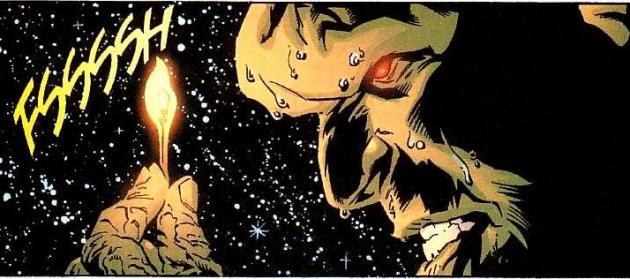
Trial By Fire is one of the best Martian Manhunter stories ever told. As I've said, Kelly had a way with beloved DC Comics characters and respected them, almost revered them, in his work. Trial By Fire is the best possible example of this. In it, Martian Manhunter's entire history is thrown into new context: his “weakness” to fire is actually not a physical phenomenon. It's a deep-seated phobia... and it was planted by someone else. Cue spooky music. As Martian Manhunter seeks love and healing, confronting the emotional trauma and psychic damage done to him through the constant pain and sorrow of his life, he unlocks a part of himself that is more powerful than he imagined... which might destroy the human race. In this story, Kelly proves himself as adept at tackling intensely personal struggles as he is topics of the political. It's a poignant and beautiful story of betrayal and forgiveness, rage and acceptance, hurt and healing, madness and love. It was a fitting end to Kelly's major work on DC Comics' flagship, and although a few more issues provided a denouement of sorts, this was the only proper way to hand the torch off.
But the best is yet to come.
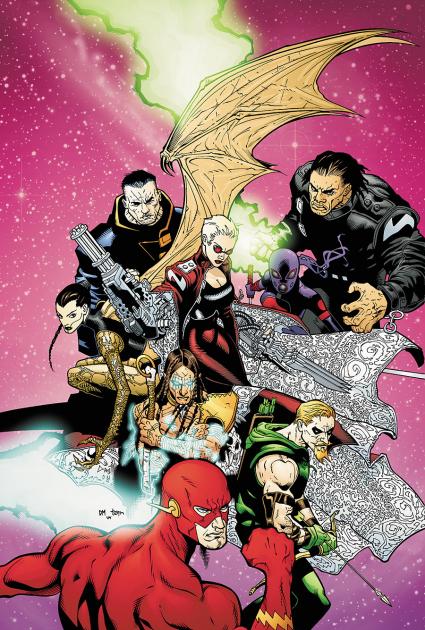
After his run on the main title had come to an end, Joe Kelly returned to the global politics, moral ambiguity and unflinching badassery of Action Comics #775 with a new title: Justice League Elite. Here, Manchester Black's “black ops superheroes,” The Elite, return led by Manchester's sister Vera Lynn, better known as the cybernetic Sister Superior. With likeable and interesting characters like African Americans John Stewart and Coldcast, native American Manitou Raven, Brazilian Menagerie and Arab Naif Al-Sheikh, we also got a taste of what comics at the turn of the millennium should look like as far as a fair sprinkling of skin colors and belief systems. Leading to the inevitable questioning of motives and methods, the teams clash and shuffle as supervillains, space monsters, international law and bad press come down on them like a ton of bricks. Hell breaks loose and it's up to good old fashioned heroics—or is it?—to save the day. Everyone's dark side comes out, but it's respectful and reasonable. Everyone has a dark side. That doesn't change who someone is. This, I think, is Kelly's whole point. These characters are people who face consequences. They're fallible, through all their honesty and integrity, and sometimes it's hard for them to follow their own rules. They see power abused, lives destroyed, innocence shattered—and just what are they supposed to do? In the filth of a world where they must sacrifice everything to remain clean, they become vulnerable and intimate—mortal—in ways they never expected. Questions are asked, doubts raised. The morality of the preemptive strike. The ethics of imperialism. Can a man stand for the law when his government breaks it? Can we ever be responsible for our great power? And if we fail... will it matter that we tried?
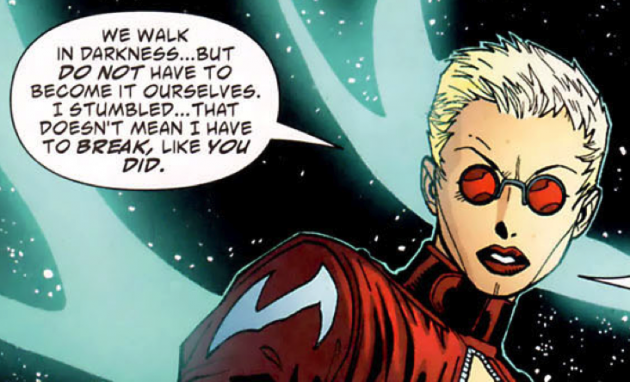
This all to say that Kelly's JLA is unquestionably worth reading and worth reading all of it.
There is a deep and powerful lesson to be learned from most good stories, and with the discernment to tell what the moral is, we can learn to be better people. Joe Kelly's work on the JLA title, regardless of it's comic-book medium, is one of those stories that can change your perspective and your thinking if you let it. Of course changing perspectives can be dangerous. But if you're willing to risk it, you might learn more than you intended. That's the mark of good writing.
Do yourself a favor. Read this run. You will not regret it.
Comments
- Wombatapult's blog


